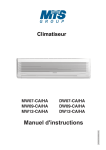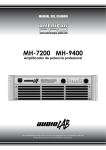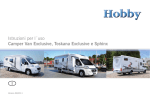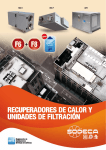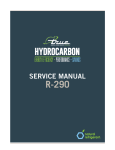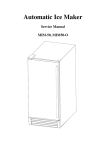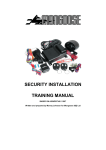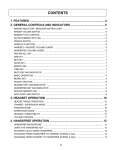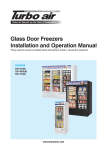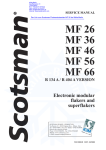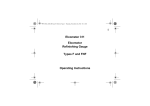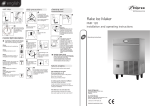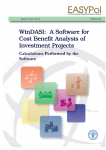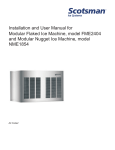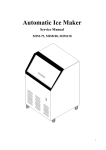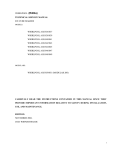Download Installation Manual of WHIRLPOOL ADN
Transcript
ICE FLAKERS Range TABLE OF CONTENTS Introduction Warnings....................................................................................................................................... 3 Description .................................................................................................................................... 3 Operating Principle........................................................................................................................ 4 Specifications Installation diagrams for inlet/outlet tubes and dimensions ............................................................. 8 Consumption data, weights, crated dimensions and volumes......................................................... 8 Technical data............................................................................................................................... 8 Model IQ 135 + S60 “Compact” .......................................................................................... 8 Model IQ 150/200/400/550 .................................................................................................. 9 Model IQ 1100................................................................................................................... 10 Production Tables ....................................................................................................................... 11 About Ice Production ................................................................................................................... 12 Delivery & Unpacking Packing ....................................................................................................................................... 13 Machine body.............................................................................................................................. 14 Rating plate and serial number .................................................................................................... 14 Installation Recommended placement of unit ................................................................................................ 15 Water and drainage..................................................................................................................... 15 Connecting unit to water source (water-cooled units) ................................................................... 16 Connecting unit to drain............................................................................................................... 16 Electrical connections.................................................................................................................. 16 Assembling the dispersion cone .................................................................................................. 16 Operation Preliminary checks ...................................................................................................................... 17 Starting up................................................................................................................................... 17 Inspection and adjustment of water level in the trough ................................................................. 18 Cross check ................................................................................................................................ 18 Adjustments Expansion valve ......................................................................................................................... 18 Water level .................................................................................................................................. 19 Pressure-controlled valve on cooling water circuit ....................................................................... 20 Fan pressostat (air-cooled models).............................................................................................. 20 High pressure safety pressostat.................................................................................................. 21 Start-up timer .............................................................................................................................. 21 Safety elements ..................................................................................................................................................21 Inspection/replacement procedures Lower bearing ............................................................................................................................. 22 Speed reducer (gearbox)............................................................................................................. 22 Upper flange ............................................................................................................................... 23 Upper bearing (depending on model)........................................................................................... 24 Maintenance and cleaning instructions Maintenance table ....................................................................................................................... 25 Water condenser ......................................................................................................................... 26 Air condenser .............................................................................................................................. 26 Evaporator/ water trough.................................................................................................................................. 26 Cleaning the water inlet filters.......................................................................................................................... 27 Checking for water leaks.................................................................................................................................. 27 Ice Queen 550. Installation instructions28 2 Troubleshooting ................................................................................................................................ 32 INTRODUCTION Thank you for choosing ITV's ICE QUEEN flaker. You have purchased one of the most reliable ice-making products on the market today. Carefully read the instructions contained in this manual since they provide important information relative to safety during installation, use, and maintenance. WARNINGS This appliance should be installed by approved Technical Service Personnel. This plug should be accessible at all times. To reduce the risk of electrical shock, ALWAYS disconnect the machine BEFORE cleaning or maintaining the equipment. Do not attempt to install, service, or modify this machine. Improper use by other than specially trained technicians is extremely dangerous and may result in a fire or electric shock. This machine should not be placed outdoors or exposed to rain. Connect to drinking water mains. This appliance is not intended for use by young children or infirm persons without supervision. Young children should be supervised to ensure that they do not play with the appliance. IMPORTANT! • DO NOT ATTEMPT TO SERVICE THIS MACHINE AS IT IS DANGEROUS AND COULD CAUSE SEVERE DAMAGE TO THE UNIT. •SERVICE SHOULD ONLY BE CARRIED OUT BY TRAINED, QUALIFIED PERSONNEL. •WE STRONGLY RECOMMEND USING ONLY ORIGINAL REPLACEMENT PARTS AVAILABLE FROM AN AUTHORIZED DISTRIBUTOR. •WASTE AND OTHER MATERIAL SHOULD BE DISPOSED OF ACCORDING TO LOCAL REGULATIONS AND PROCEDURES FOR WASTE DISPOSAL. •CLEANING AND MAINTENANCE ARE NOT COVERED BY THE WARRANTY. 3 DESCRIPTION Main Features of the Machine § 18/8 stainless steel housing § Powerful speed reducer (24Kg./m. @ 7 rpm.) § Copper evaporator on precision bored tubing (HB 50) § Durable stainless steel auger with resilient coating § Ice drops out of the bottom of unit § Speed reducer in top part of the unit § Ecological refrigerant R404a OPERATING PRINCIPLE Water enters water trough via a float valve which provides a constant head of water. Through a hole in the bottom of the trough, water flows into the bottom of the evaporator and floods it to the same height as in the water trough. Water freezes upon contact with evaporator wall, and is scraped off as ice by the vertical, rotating auger. Ice is carried upward until it passes through discharge flap and falls into bin. When bin is full, automatic shut-off sensor (micro-switch on discharge flap) switches off machine. IMPORTANT! If unit is placed on top of a cold room, and/or ice has to fall a long distance from unit, a MECHANICAL ICE LEVEL SENSOR should be installed. To prevent ice from compressing in cold storage, we recommend transferring ice through a plastic tube (80-100 mm diameter) attached to its lower end the DISPERSION CONE which is PROVIDED WITH THE MACHINE in all models. 4 IQ monofásica esquema eléctrico - wiring diagram 5 6 IQ-400-550 / R404A/ trifásica esquema eléctrico - wiring diagram 7 8 SPECIFICATIONS Model: ICE QUEEN 135 S60 5 0 0 1 3 6 9 Ice discharge slot Water trough overflow Rating Plate Serial number Cooling water drain (water-cooled models) Electrical connection Water inlet Height increases by 80 mm when feet are fitted MODEL ICE BIN STORAGE CAPACITY (KG) IQ 135 A 60 IQ 135 W 60 MODEL IQ 135 A IQ 135 W Ice bin drain COOLING WATER CONSUMPTION (L/Hour) WATER CONSUMPTION DIMENSIONS (CRATED) X*Y*Z GROSS WEIGHT (KG) VOLUME 5.5 70 85 0.58 5.5 68 615x650x146 5 615x650x146 5 83 0.58 HIGH PRESURE MINIMUM Psi 2 (gr) Kg/cm 500 360 16 16 228 228 3 (M ) (L/Hour) 40 REFRIGERANT CHARGE NET WEIGHT (KG) MAXIMUM Psi 2 Kg/cm 17 17 242 242 LOW PRESURE TOTAL AMPS FUSE RATING COMPRESSO R POWER TOTAL POWER AVERAGE Psi 2 (2) (A) (A) (1) (W) (2) (W) 2.5 2.5 4.2 4.2 16 16 360 360 650 650 Kg/cm 35 35 (1) Data obtained at room temperature 20°C, water introduced at 15°C; water quality = 500ppm (2) Maximum consumption obtained at room temperature = 43°C, according to UNE climate classification, Class T (TROPICALISED). NOTE: Expansion controlled by capillary. 9 Model: ICE QUEEN 150 / 200 / 400 / 550 Rating Plate Serial number Cooling water drain (water-cooled models) IceElectrical dischargeconnection slot Water trough overflow Water inlet MODEL X Y Z A B C D IQ 150 A/W IQ 200 A/W IQ 400 A/W IQ 550 A/W 515 515 675 675 550 550 550 550 500 575 660 800 50 70 70 70 80 92 92 92 207 207 227 227 85 85 89 89 MODEL IQ 150 A IQ 150 W IQ 200 A IQ 200 W IQ 400 A IQ 400 W IQ 550 A IQ 550 W 10 COOLING WATER CONSUMPTION (L/Hour) 40 60 114 177 WATER CONSUMPTION NET WEIGHT (KG) DIMENSIONS (CRATED) X*Y*Z GROSS WEIGHT (KG) VOLUME 580x630x560 580x630x560 580x630x645 580x630x645 740x630x730 740x630x730 740x630x865 740x630x865 55 53 60 58 94 589 115 113 0.20 0.20 0.23 0.23 0.33 0.33 0.39 0.39 3 (M ) (L/Hour) 5.6 5.6 8.5 8.5 16 16 25 25 45 43 52 50 85 80 95 93 MODEL IQ 150 A IQ 150 W IQ 200 A IQ 200 W IQ 400 A IQ 400 W IQ 550 A IQ 550 W REFRIGERANT CHARGE HIGH PRESURE MINIMUM Psi 2 (gr) Kg/cm 500 360 430 400 630 440 1050 1050 16 16 16 16 16 16 16 16 228 228 228 228 228 228 228 228 MAXIMUM Psi 2 Kg/cm 17 17 17 17 17 17 17 17 242 242 242 242 421 242 242 242 LOW PRESURE TOTAL AMPS FUSE RATING COMPRESSOR POWER TOTAL POWER AVERAGE Psi 2 (2) (A) (A) (1) (W) (2) (W) 2.5 2.5 2.5 2.5 2.5 2.5 2.5 2.5 4.2 4.2 4.6 4.6 5.8 5.8 9.2 9.2 16 16 16 16 16 16 20 20 365 365 440 440 690 690 1000 1000 660 660 800 800 1100 1100 1700 1700 Kg/cm 35 35 35 35 35 35 35 35 (1) Data obtained at room temperature (20°C), water introduced at 15°C; water quality = 500ppm (2) Maximum consumption obtained at room temperature = 43°, according to UNE climate classification Class T (TROPICALISED). NOTE: Expansion controlled by capillary, except for model IQ400 and 550 which is controlled by a thermostatic valve. Models: ICE QUEEN 400 & 550 380V+III+N MODEL REFRIGERAN T CHARGE 404ª (GR) HIGH PRESURE Kg/cm IQ 400 A IQ 400 W 635 635 16 16 228 228 17 17 242 242 IQ 550 A IQ 550 W 1500 1500 16 16 228 228 17 17 242 242 MÍNIMA Psi 2 LOW PRESURE MÁXIMA Psi Kg/cm 2 NOTE: Expansion controlled by a thermostatic valve. 11 MEDIA Psi Kg/cm 2 2.3 33.4 2.3 33. 4 2.3 33.4 2.3 33. 4 TOTAL AMPS FUSE RATING COMPRESSO R POWER TOTAL POWER (2) (A) (A) (1) (W) (2) (W) 3.5 3.5 10 10 750 750 1350 1350 5 5 16 16 2200 2200 2x2700 2x2700 Model: ICE QUEEN 1100 Rating Plate Serial number Cooling water drain (water-cooled models Electrical connection Water trough overflow MODEL IQ 1100 A IQ 1100W MODEL IQ 1100 A IQ 1100 W COOLING WATER CONSUMPTION (L/Hour) WATER CONSUMPTION Water inlet NET WEIGHT (KG) DIMENSIONS (CRATED) X*Y*Z GROSS WEIGHT (KG) VOLUME 192 185 1400x685x835 1400x685x835 225 218 0.80 0.80 3 (M ) (L/Hour) 50 50 354 REFRIGERANT CHARGE HIGH PRESURE MINIMUM 2 Psi (gr) Kg/cm 2x1500 2x1500 16 16 228 228 MAXIMUM 2 Psi Kg/cm 17 17 242 242 LOW PRESURE TOTAL AMPS FUSE RATING COMPRESSOR POWER TOTAL POWER AVERAGE psig (2) (A) (A) (1) (W) (2) (W) 9 9 2x16 2x16 2x2200 2x2200 2x2700 2x2700 Kg/c 2 m 2.5 2.5 35 35 (1) Data obtained at room temperature 20°C, water introduced at 15°C; water quality = 500ppm (2) Maximum consumption obtained at room temperature = 43°, according to UNE climate classification Class T (TROPICALISED). NOTE: Expansion controlled by a thermostatic valve. -Power inlet should be 3-phase III+N+T (380 V/50 HZ) 12 PRODUCTION TABLES FOR ICE FLAKERS A M B I E N T T E M P E R A T U R E ºC 45 104 102 IQ135A 96 92 86 82 78 106 104 99 40 119 114 111 102 98 95 94 120 118 109 35 134 124 118 115 110 106 102 129 122 30 136 134 123 120 111 109 106 137 25 139 135 126 121 119 115 110 20 141 138 131 123 121 119 15 142 141 132 126 124 10 144 142 134 128 5 10 15 20 45 192 184 40 198 35 IQ150A 94 88 84 80 107 104 101 97 119 117 115 113 104 128 123 120 118 115 112 139 137 129 122 120 117 114 114 141 139 136 124 122 119 116 122 118 145 144 138 134 124 121 120 126 124 120 150 145 141 137 134 124 122 25 30 35 5 10 15 20 25 30 35 IQ200 A 168 156 144 138 118 330 325 310 251 232 192 184 169 155 143 136 352 342 334 324 306 275 255 204 196 190 176 168 154 142 370 360 354 338 313 287 275 30 207 204 194 188 174 168 154 385 378 372 360 332 310 300 25 210 206 202 191 187 174 167 400 395 378 360 343 325 308 20 213 209 205 201 190 186 173 410 405 387 365 354 335 315 15 221 211 208 205 200 190 185 418 409 400 375 365 346 326 10 224 220 211 208 204 198 188 430 420 412 395 380 360 340 5 10 15 20 25 30 35 5 10 15 20 25 30 35 45 470 450 IQ550A 420 400 370 360 345 IQ1100A 1960 1940 1912 1816 1760 1656 1600 40 500 480 454 430 405 390 375 2064 2048 1976 1904 1800 1760 1656 35 520 540 490 455 435 425 405 2296 2232 2040 1976 1904 1800 1752 30 600 566 538 510 480 465 455 2360 2320 2248 2136 1960 1880 1792 25 611 568 549 522 500 486 471 2400 2376 2320 2232 2136 1960 1872 20 622 570 560 535 515 498 482 2436 2424 2400 2320 2224 2120 1960 15 626 589 567 540 520 502 488 2448 2432 2420 2384 2312 2224 2112 10 630 608 575 545 525 506 495 2480 2444 2432 2416 2384 2296 2200 5 10 15 20 25 30 35 5 10 IQ 400 A 300 280 15 WATER TEMPERATURE (°C) Water quality = 500 ppm (240 Microhms/cm) 20 25 30 Kg/Day About ice production IMPORTANT: Production figures have been obtained under the following conditions: 13 35 Water Quality: 550 ppm. total solids Water Temperature: 15°C Ambient Temperature: 20°C Ice production and quality is heavily dependent on the following: a) Ambient temperature b) Water temperature c) Water quality d) Level of water in evaporator The following graph illustrates variations in production according to these factors. As shown, production decreases as water temperature increases. IT IS IMPORTANT THAT WATER INTAKE TUBE IS NOT CLOSE TO ANY HEAT SOURCE. THIS WILL AFFECT ICE PRODUCTION AND QUALITY. • Ambient temperature should be taken 4cm away from the centre of the front grille • Water temperature should be taken inside the water trough. Check that water line and filter do not receive hot air from condenser + fan. If so, then re-direct water inlet line + filter to avoid hot air current. • Ice quality can be improved by lowering the position of the water trough. The trough is attached to a panel with two screws. This panel has several slots, so that the trough can be moved up or down as required. • The trough may be lowered up to 80mm (IQ 550/1100). This will result in decrease of production (see dotted line in graph below), but harder, drier ice. • Water content in ice (obtained by straining ice) may be as much as 10% • Ice production also decreases with improved water quality. (See graph for approximate production variations). Production Variations According to Water Quality When Water Temperature is Maintained at 15°C. * 1500 ppm * 1000 ppm * 500 ppm * Level -60 mm (500 ppm) * 30 ppm 10 15 20 25 30 Room temperature DELIVERY & UNPACKING 14 35 40 45 Upon receipt, thoroughly inspect the packing container. If there appears to be damage to the container contact the shipper immediately. Unpack unit in the presence of delivery personnel noting any damage on the waybill. ITV packing bears the “Green Point” on all models according to the European Directives on management of Packaging and Waste Disposal. Be sure to include model name and serial number on all claims. Serial number is located in the following three places: (1) Packing There is a label stuck onto the cardboard packing bearing this serial number (1). (2) Machine body On the back of the machine (1). (3) Rating plate and serial number Located at the back of the machine. Water cooled machines: check that the drainage hose at the back of the machine is in good condition. Verify that the installation kit is inside the bin, and has the following pieces: scoop, 3/4’ water hose, two small filters and user manual. In all models there is a large particle filter (5 micres) with accessories, and an ice dispersion cone. WARNING: DO NOT LEAVE PACKING MATERIALS (PLASTIC BAGS, CARDBOARD BOXES, ETC.) WITHIN REACH OF CHILDREN. 15 INSTALLATION Recommended Placement of Unit IMPORTANT! ICE QUEEN machines are intended to operate at room temperature between 5°C and 43°C and with water temperature ranging between 5°C and 35°C. You may encounter evaporator/gearbox malfunctions should the machine run at temperatures below the recommended minimum. When running above maximum recommended temperatures you can expect shorter compressor life and decreased production. Air-cooled units receive air input via front of machine and expel air through rear grille. IMPORTANT! If front and/or rear ventilation is inadequate, obstructed, or in close proximity to other heat producing machinery, use of a water-cooled unit is strongly recommended. The above mentioned also applies should unit be installed in an area where dust, smoke, or other airborne pollutants may be present. Units—especially air-cooled ones—should not be installed in kitchens. To facilitate access to condenser and/or water pressure valve, allow sufficient space at front of the machine. Ensure that flooring is firm and even. Water and Drainage Water quality influences ice hardness, flavour, and quality as well as condenser life. Keep in mind the following points: a) WATER IMPURITIES: Major impurities are eliminated by the two small wire mesh filters provided and installed on either end of the water inlet hose. Filters should be cleaned/replaced regularly depending on purity of water. For minor impurities we recommend installing a 5-micron filter such as the one provided with the unit: Part # ITV 207499. This filter will need to be replaced only when machine stops due to insufficient water flow (filter is obstructed with impurities). b) WATER WITH MORE THAN 500 PPM: Ice will be less hard and tend to adhere. Lime deposits may impede proper function. In water-cooled models, condenser obstruction is likely. Installation of a high quality water softener is recommended. c) CHLORINATED WATER: In most cases the filter which is included in the machine should be sufficient. However, if mains water smells or tastes of bleach, this indicates an excess of chlorine, which may eventually corrode the stainless steel auger. A carbon filter will remove chlorine in water (average filter life: 6 months), not included with machine. (Part # ITV 207509). (NOTE: You may encounter water with ALL aforementioned properties.) 16 d) PURIFIED WATER: A 10% reduction in overall production may occur. Connecting Unit To Water Source • Use 1.3 m. flexible tube (with the two filters attached) provided. NOTE: We advise using a single faucet fixture. • Water pressure should be between 0.7 and 6 Kgs/cm2. (10/85 Psi.) • If water pressure exceeds these values, installation of appropriate corrective units will be necessary. • It is important that water tubing does not come close to or in contact with any heat sources or heat generated by unit as this could decrease production. Connecting Unit To Drain (Water -cooled Models) • Drain must be located at least 150mm below machine level. Drain tube must have an inner diameter of 30mm and a minimum gradient of 3 cm per metre.(3%) Electrical connection • Unit is provided with a 1.5 m cord and Schucko socket (except for models IQ550 and IQ1100). • A switch and adequate fuses should be installed. Nominal voltage and intensity are indicated on rating plate as well as on this manual's technical pages. Voltage fluctuations greater than 10% can cause problems or prevent machine from starting. • Line to base of plug must have a minimum section=2.5 mm2 for models up to IQ 200 and 4 mm2 for other models. • Be sure voltage indicated on rating plate corresponds to that of mains supply. IMPORTANT! Supply socket must be properly earthed. Be sure to check standard for country where appliance is going to be installed. Assembling the dispersion cone This device spreads ice evenly so it does not pile up beneath exit tube. Its position can be altered to redirect ice, and hence prevent the “pyramid effect”. 17 OPERATION Preliminary Checks a) Is machine levelled? b) Are voltage and frequency of mains supply the same as indicated on rating plate? c) Is drainage system working properly? d) Is air circulation and room temperature adequate? (Air-cooled models) AMBIENT TEMPERATURE WATER TEMPERATURE MAXIMUM 43° C 35° C MINIMUM 5° C 5° C e) Is water pressure adequate? MAXIMUM MINIMUM 0.7 Kg/cm2 6 Kg/cm2 ATENTION: Check that voltage and mains frequency is the same as in the rating plate. Starting up Once preliminary check has been completed (ventilation, connections, temperature, etc.), proceed as follows: 1. Remove top cover of unit 2. Open faucet, make sure there are no leaks and check that water level is adequate. 4. Set switch to OFF position. 5. Connect unit. 6. Check for air bubbles in water supply tubing (water trough to evaporator) IMPORTANT! Be sure voltage and frequency of mains supply is as indicated on rating plate. 1. Set appliance switch to ON position. All elements should be working except for fan (air-cooled machines) which will commence operation only when high pressure activates it. All pilot lights should be switched off except for power display (green), indicating that power is on. Otherwise check the troubleshooting section of this manual. 18 2. Make sure fan blades don't come into contact with anything and that none of the tubes vibrate. Inspection and Adjustment of Water Level in the Trough 1. Make sure water level in trough does not go down completely as this will set off "WATER LOW" sensor while machine is operating. Should this happen with a pressure higher than 1Kg/cm2 and filters in good condition, INCREASE LEVEL by bending the float arm upwards. 2. Turn machine off and wait for flotation valve to close before water escapes through maximum level drain. If that happens and pressure is lower than 6kg./cm2, slowly bend and lower the float’s arm until you have achieved an adequate flow. IMPORTANT! If water pressure exceeds 6 kg./cm2., a pressure reduction unit should be installed to maintain pressure at 4kg./cm2. Cross Check a) Shut off water faucet. Water level will recede until automatic shut-off occurs. b) Open water faucet. Water level will rise and machine operations will commence in 3 minutes’ time. IMPORTANT! Please instruct end user as to the correct maintenance procedures as described above. The manufacturer declines all responsibility for damage caused by failure to properly maintain the equipment. 19 ADJUSTMENTS Expansion valve. DO NOT TOUCH THE EXPANSION VALVE. Water Level The purpose of maintaining proper water levels is to allow adequate water flow to the evaporator. A water level sensor has been incorporated to shut off unit until required minimum water level is achieved. The optimal water level is indicated in diagram below. 20 Pressure-controlled Valve on cooling water circuit • The purpose of this valve is to control cooling water flow to the condenser, so as to maintain the high pressure at 16.5 bar (232-240 Psi), which corresponds to water temperature of 40°C (exit temperature). • If mains water temperature exceeds 32°C, the above values of high pressure and water temperature at exit will be higher. ADJUSTMENT: High pressure (and water temperature) can be decreased by opening valve (turn screw clockwise). Fan pressostat (air–cooled models) High pressure is controlled by starting and stopping fan, which provides airflow through condenser. Differential is fixed. (1Kg/cm2 or 14 Psi.) Cut-off pressure should be 16 Kg/cm2 (228 Psi.) Low pressure values in circuit may cause gearbox malfunction due to excessive ice production. Pressure values higher than 14 Kg/cm2 will diminish ice production and may shorten compressor life. Pressure can be regulated by rotating screw on Pressure Control Valve (clockwise to increase pressure). One full turn is equivalent to about 1.5 Kg/cm2. 21 Safety pressostat This safety device trips when pressure is too high. Pressure might reach the set limit of 27 Kg/cm2 when: a) Air circulation is not sufficient, room temperature is too high, condenser is dirty or fan motor is broken. (air-cooled models) b) Insufficient water in the cooling circuit, inlet water temperature is too high or fan motor is broken (water -cooled models). The safety pressostat will switch off the machine completely until pressure drops again to its lower set point value (21 Kg/cm2) HIGH PRESSURE SET POINTS (non-adjustable): 27-21 Kg/cm2 (380-296 Psi.) Start up timer This timer delays start up for 2-3 minutes after machine is switched on. This delay allows ice formed on evaporator to partially melt. When the machine restarts ice will be wet and loose in evaporator, and hence gearbox/auger breakage risk is reduced. THIS TIMER ONLY WORKS WHEN MACHINE IS WARM. Safety devices. • Overload protection device: will trip if maximum current intensity (A) is exceeded, hence preventing the motor from overheating due to current peaks. When overload trips, a red light will switch on in the front panel. The overload must be reset manually, to do so the front grille and overload cover must be removed. • Thermal protection device: will trip if temperature in motor exceeds set point. When this device trips, the same red light will switch on in the front panel. In this case, however, reset is automatic. • Low water level sensor: a magnetically activated sensor (buoy) located inside the water trough will switch off the machine should the level of water fall below the set minimum. A red light will switch on in the front panel labelled “low water level”. Reset is automatic. • Bin full of ice: a micro-switch located at the top of the evaporator will stop the machine when the bin (and the ice discharge tube leading to the bin) is full of ice. An orange light will switch on in the front panel labelled “bin full”. Reset is automatic. 22 INSPECTION AND REPLACEMENT PROCEDURES Lower bearing Materials needed: - PHILLIPS N°2 Screwdriver - M8 Screws (*) - 5 mm Allen key - Nylon head hammer - No. 12-13 wrench Procedure: 1) Disconnect unit. 2) Close faucet. 3) Remove square black plastic lower lid on machine base. 4) Remove drain plug on lower bearing. 5) Remove side screw that holds bearing with a 5 mm Allen key. 6) Introduce M8 50 mm screw in drain plug hole. Bearing will come out as you tighten screw. 7) Check for wear inside bearing and replace if more than 0.25 mm. 8) Replace o-rings, add silicone and grease, clean evaporator and reassemble. IMPORTANT! Side hole must be aligned with the one in evaporator, otherwise you will not be able to insert Allen screw in place. 1) Open water faucet and check for leaks. 2) Assemble unit and connect to power source. 3) IMPORTANT: DISCARD ICE PRODUCED DURING FIRST 15 MINUTES. Speed Reducer (Gearbox) Materials needed: § Extractor § M8 Screws § No.12-13 monkey wrench (2) § No.8-9 monkey wrench § 6 mm Allen key § M8 nuts (2) 23 Procedure: 1) Remove top screw on gearbox. 2) Remove the four screws that hold flange. 3) Remover gearbox using extractor Assembly: 1) Lubricate motor axle with grease. 2) Place gearbox face up. 3) Screw in (*) screw, place washer and lower gearbox by tightening nut. WARNING: Do not hammer. 1) Face up clamps socket. 2) Remove (*) screw. Place washer and tighten until spindle is flush with gearbox axle. Upper flange Materials needed: § Extractor § PHILLIPS N°2 Screwdriver § M8 Screws (110 mm) § No.12-13 monkey wrench (2) § No.8-9 monkey wrench § 4, 5 and 6 mm Allen key § M8 nuts (2) Procedure: 1) Disassemble gearbox (see previous section) 2) Remove all four screws holding brackets. 3) Remove all three screws that keep plate and evaporator together. 4) Remove gearbox by hand or using extractor. Assembly: 1) Clean lodging and neck plate. 2) Mount plate. IMPORTANT: End of ice discharge flap must be to the right of evaporator's window. IMPORTANT: Carefully lubricate seal lips (depending on model), avoid damaging them. 1) Replace the three evaporator/plate screws. 2) Replace brackets. 3) Reassemble gearbox. (see previous section) 24 Upper bearing (depending on the model) Materials needed: § Extractor § PHILLIPS N°2 Screwdriver § M8 Screws (110 mm) § No.12-13 monkey wrench (2) § No.8-9 monkey wrench § 4, 5 and 6 mm Allen key § M8 nuts (2) 1) Disassemble gearbox (see previous sections) 2) Disassemble plate/flange (see previous section) 3) Remove top seals. 4) Place and fix extracting ring. 5) Strike chisel placed over extracting ring using nylon head hammer. Assembly: 1) Install new seals and lubricate (SHELL MULTIFAK EP2 TE code ITV420). 2) Secure bearing. 3) Mount plate. IMPORTANT: Be careful not to damage seals. Lubricate seal lips with grease. 25 MAINTENANCE AND CLEANING INSTRUCTIONS IMPORTANT! **Maintenance and cleaning procedures as well as problems derived from failing to carry them out are not covered by the warranty. Proper maintenance is essential to obtain favourable ice quality and optimum functioning of unit. Frequency depends on water quality and characteristics of room where unit is installed. ** Maintenance/cleaning procedures should take place at least once every six months. If concentration of air pollutants is high, complete procedures on a monthly basis. MAINTENANCE TABLE: PROCEDURE MONTHLY Air condenser cleaning 0000 Water condenser cleaning Lower bearing check Upper bearing check Water circuit cleaning Sanitary cleaning Motor reducer (gearbox) 0000 cleaning Motor reducer (gearbox) oil level Water filter 0000 cleaning/replacement Upper bearing lubrication Gearbox oil change General unit cleaning &&& 0000 Depending on room characteristics #### Depending on water quality &&& Carried out by owner **** Essential QUARTERLY BIANNUAL YEARLY BIENNIAL DURATION 0000 **** **** #### **** **** **** 30 minutes 90 minutes 60 minutes 90 minutes 45 minutes 30 minutes 30 minutes #### #### #### 0000 #### #### 60 minutes 0000 30 minutes &&& 30 minutes 60 minutes -- &&& &&& &&& Maintenance and cleaning procedures as well as problems derived from failing to carry them out ARE NOT COVERED BY THE WARRANTY. Service personnel will invoice you for travel expenses, time invested and materials required for maintenance and cleaning of unit. 26 MAINTENANCE AND CLEANING PROCEDURES WARNING: Unit should always be disconnected during maintenance/cleaning procedures. Water Condenser 1) Disconnect machine. 2) Close water faucet. 3) Disconnect water entry/exit from condenser. 4) Prepare a solution of 50% phosphoric acid in distilled water. 5) Distribute solution through condenser. (Solution is more effective at 35°-40°C). WARNING! DO NOT USE HYDROCHLORIC ACID Air Condenser 1) Disconnect machine. 2) Close water faucet. 3) Clean condenser using a vacuum cleaner, soft brush and/or low-pressure air. Evaporator/Water Trough 1) Disconnect machine. 2) Remove drain plug situated in lower bearing of evaporator. Use a container to collect water. 3) Allow water to flow for 2 to 3 minutes. 4) Close water faucet and replace plug in evaporator. 5) Prepare a solution of 50% phosphoric acid in distilled water. Do not use hydrochloric acid. Slowly pour solution into water trough. (Solution is more effective at 35°-40°C). 6) Allow solution to stand for 20 minutes. 7) Remove lower plug and empty trough. Replace plug. 8) Fill trough with solution to maximum capacity. Connect machine and wait for unit to automatically shut off when remaining liquid drains. WARNING:** Discard ice produced during cleaning procedure. 9) Disconnect machine, remove plug, open faucet and let water run for 2 to 3 minutes. 10) Close faucet, place plug, open faucet and connect the machine. **At this point sanitary cleaning starts 27 11) Slowly add bleach to water trough for at least 5 minutes. Allow machine to make ice for at least 15 minutes. WARNING:** Discard ice produced during cleaning procedure. 12) Disconnect unit, place cover and check for water leaks. Change seal in water plug if necessary. 13) Replace filters if necessary. (Machines provided with 5mm wire gauze filters). 14) Reconnect machine. Cleaning the water inlet filters These round wire gauze filters placed on either end of the water hose to mains, often become blocked in the first few days of use, especially when the plumbing installation is new. Clean them under a jet of water. Checking for water leaks This must be done whenever maintenance is carried out on the machine: check all water connections, braces, tubes and hoses in order to eliminate leaks and prevent breakages and flooding. Check that the valve closes tightly on models with an automatic cleaning system. NOTE: You will observe that after a certain period of functioning (the running-in period), lowpressure pressostats may need to be adjusted. This second adjustment will be final. RUNNING-IN CHECK It is essential to service the machine after about 10 working days, or earlier if any incident has occurred. CHECK: • Water level • Minimum high pressure (fan should stop at 35-37ºC, equivalent to 5.25 bar, 67.5 psi) • By-pass opening at -21ºC ± 0,5ºC during the first few minutes after start-up • Ice dispersion cone is spreading ice uniformly inside the bin. • Refrigerant charge (when fan switches off, bubbles should appear at the sight glass, and return line to the compressor should be covered in frost right up to the weld). If high-pressure manometer is connected do not disconnect until you stop the machine and pressures have stabilised. Check that a large amount of gas has not been lost in connecting/disconnecting manometers, and use the shortest hoses you can find in H.P. • Any gearbox oil leaks? 28 NOTE: Newly installed electromechanical control devices will suffer variations in their adjustment caused by the machine’s own functioning. Once a second adjustment of these devices is carried out, this should be good for several years. It is recommended, however, to check these devices yearly, this is best done between October to April. SAFETY TRIP (CIRCUIT-BREAKER) IN NEW MACHINES WILL SWITCH OFF THE MACHINE DUE TO ONE OF THE FOLLOWING: • Ambient temperature is below 5ºC • Water temperature is below 5ºC • Evaporation temperature is below -20ºC • Cooling temperature below +30ºC • Refrigerant charge slightly low In the first three cases, so long as temperatures do not drop below 3ºC (machine limit), re-adjust fan pressostat to 42ºC and check that by-pass opens at -21ºC. In the last two cases bypass will open and close very often. Adjust bypass, fan pressostat and add refrigerant if necessary. Gearbox current consumption should be between 1.9A (min) and 2.6A (peaks) with an average 2.2A. Safety trip will work at 2.4-2.6A and switch off the machine immediately. If the machine is over 2 years old, also inspect the auger, bearings, and grease on bearings. In case of excess current consumption, you can verify that the problem is in the gear-box by either physically detaching gearbox and motor from auger and checking current consumption, or by removing only the brown wire which provides current to the compressor. In order to avoid damage to the gear-box, the safety trip is very sensitively adjusted and may trip easily. You may teach the end user to re-connect the machine (by inserting a pen/screwdriver through the front grille blades). This is best done after a one hour pause. Should the machine trip on a regular basis (more than once a week), the end user must get in touch with the service department. 29 SPECIAL ADVICE CONCERNING R-404 REFRIGERANT • R-404 is a mixture of 3 liquid-phase gases. On evaporating, the 3 component gases separate • Always use the liquid phase valve (at the end of condenser or accumulator) for refills and purges. • When replacing a compressor, wash inside of circuit with a suitable solvent + pump, dry with nitrogen gas, REPLACE THE DRIER WITH ONE SUITABLE FOR R-404, which must also have ANTI-ACID properties. • If you need to add oil, use one which is specific for R-404 (POE). If you are in doubt, contact the machine manufacturer. • If there is a leak anywhere in the circuit where R-404 in the GAS phase, and a refill of over 10% is required, then ALL THE GAS IN THE CIRCUIT MUST BE PURGED AND THEN REFILL AS DESCRIBED PREVIOUSLY (LIQUID PHASE VALVE) • When charging via low-pressure valve, do not start compressor immediately, allow about one hour for liquid to gasify. 30 TROUBLESHOOTING PROBLEM PROBABLE CAUSE SOLUTION 1) Machine not running. A) There is no power. B) Water trough is empty. A) Check power source. B) Check the water supply. Check filters. Open faucet C) Fix/replace sensor. D) Check: contactor, circuit, breaker, pressostat, timer, electric installation and magnetic micro E) Replace. C) “Full bin” sensor malfunction. D) No apparent cause. E) Timer is faulty. 2) Machine works, but doesn’t make ice. A) Refrigerant leak. B) Faulty compressor. C) valvula de expansion cerrada o estropeada or capillary obstructed D) Water/humidity in refrigerating system. 3) Machine works inconsistently A) Water pressure lower than 0’7 BAR (pressure may sometimes drop greatly when several taps are opened elsewhere in premises) B) Water pressure is appropriate (0’7 a 6’5 BAR) 4) Compressor works in intermittent manner. 5) Ice is too wet. A) For smaller units try regulating the water trough float. Larger machines might require installation of a mains pressure raising unit. B) Regulate water level in trough. A) Condenser is dirty A) Clean condenser. B) Air circulation obstructed. C) Defective condenser fan. D) Fan pressostat is defective or needs adjustment. E) Safety pressostat is defective. F) Compressor start system is defective. G) Pressostat valve is defective or needs adjustment. H) Voltage too low/insufficient line section B) Re-establish air circulation. C) Check and replace fan. D) Check and replace/adjust A) Room temperature too high (over 35ºC) B) Water temperature too high (over 30ºC). A) Relocate unit to a cooler place. B) Ensure that filter and inlet tube are away from heat sources, such as hot air blown by machine’s own fan. C) Lower the water trough. Install water purifier. D) Clean condenser. E) Adjust or replace valve. C) Poor water quality (over 1500 ppm) D) Condenser is dirty. E) Pressure-controlled valve on cooling water needs adjustment or is defective. F) Low compressor output 31 A) Repair leak and recharge refrigerant . B) Replace compressor. C) Open or Replace valve (or capillary) and dehydrating filter. D) Charge compressor oil, replace capillary and dehydrator (use an anti-acid one), create a vacuum in the installation, slightly warm up all components and charge refrigerant. E) Check and replace. F) Check and replace. G) Adjust, repair or replace valve. H) Inspect and replace if necessary. F) Replace compressor. G) Refrigerant leak G) Repair leak and recharge refrigerant. H) Water level in trough is low. Water H) Check water pressure. Look consumption is greater than buoy valve for obstruction in filters or valve. pass. Adjust water level in trough 32 PROBLEM PROBABLE CAUSE SOLUTION 6) Water leaks A) Water from trough overflows and falls into ice bin. Buoy valve does not close. B) Defective o-rings in lower bearing. A) Adjust water level. Reduce water pressure. Clean or replace valve. B) Seal with silicone or replace. 7) Machine is unusually noisy A) Defective fan or loose blades B) Vibrating components C) Compressor makes noise. A) Tighten blades or replace fan. B) Tighten loose parts C) Replace compressor 8) Motor is unusually noisy A) Back fan within motor is loose B) Worn ball bearings. A) Open motor and tighten fan. B) Replace ball bearings or motor. 9) Gearbox is unusually noisy A) Defective/worn parts within gearbox A) Open gearbox and replace defective parts, or replace entire gearbox. 10) Evaporator is unusually noisy A) Upper or lower bearings are defective or dirty. B) Auger and/or evaporator are scratched. A) Replace, clean and/or lubricate bearings. B) Check and replace if necessary. 11) Machine not working. Red pilot light is switched on in front panel. A) Input voltage subject to oscillation which trips the machine. A) Check voltage and rearm circuit breaker. Need a voltage stabiliser? B) Replace electrical condenser B) Electrical condenser on motor is faulty C) Condensation pressure in refrigeration circuit is too low D) Evaporation pressure (and temperature) too low E) Lower or upper bearing is damaged and auger may be scratching evaporator. F) Defective/worn parts within gearbox G) Bearing on motor reducer is blocked. 33 C) Adjust fan pressostat (aircooled models) or cooling-water control valve (water-cooled models) D) Adjust fan pressostat (aircooled models) or cooling-water control valve (water-cooled models), check refrigerant charge and expansion valve setting if applicable. E) Replace damaged bearing(s). Look for scratches on the bearings and on the vertical grooves inside evaporator. Check auger blade for sharpness and scratches F) Open gearbox and replace faulty parts, or replace entire gearbox. G) Repair or replace motor.

































